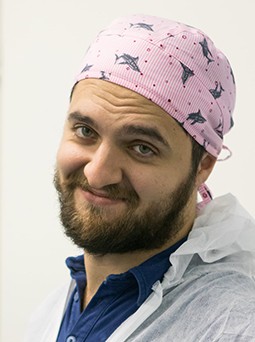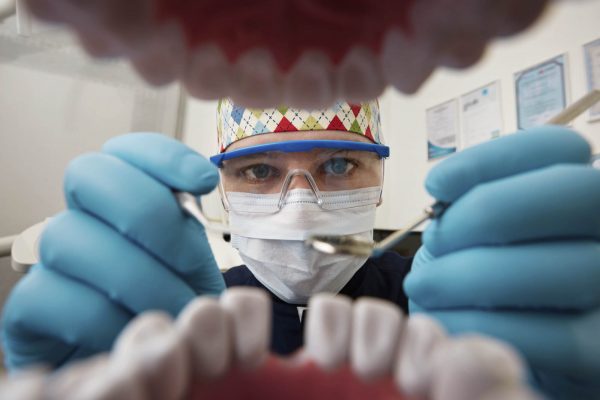 You are sitting in a chair with your mouth wide open, and the doctor advises, “We will whiten the teeth, remove the nerve, just in case, and then we will do the filling!” Would you agree? Do dentists have their own “pseudo-medicine” and how to understand if they are trying to trick you to spend more money? Robert Mamikonyan, a dentist of the highest category and author of more than 10 scientific articles, replied.
You are sitting in a chair with your mouth wide open, and the doctor advises, “We will whiten the teeth, remove the nerve, just in case, and then we will do the filling!” Would you agree? Do dentists have their own “pseudo-medicine” and how to understand if they are trying to trick you to spend more money? Robert Mamikonyan, a dentist of the highest category and author of more than 10 scientific articles, replied.
“Let’s remove the nerve, what if it starts to hurt?” Do Not Agree
“Do dentists try to trick you into spending more money? Or are the things that the dentist offers always reasonable?”
“There are as many critical moments as there are people in this area. If a patient got a dental appointment, after seeing an ad or through various CRM systems with sales funnels (when people find you in social networks, if you ever wrote words “implants”, “nerve” and so on), this patient already costs the clinic a certain amount money, of course. It will be interested in selling basic services or a complex of treatment to the patient. It works differently depending on the clinic, but in general there are such clinics. And a suggestion like, “Let’s whiten your teeth before doing the filling to make them brighter” are certainly not entirely justified.”
“Can a doctor treat non-existent diseases?”

Robert Mamikonyan
“Perhaps there are such doctors, they are all different. Sometimes there is pigmentation on a tooth, some darkening, which has existed for decades and does not develop. But the doctor perceives it as caries and treats it. Or he tells the patient that it is caries and also treats it.”
“In this case, what should the patient do when it comes to pigmentation, for example?”
“As a whole, the right decision is to find a doctor, whom you trust, of course. I always tell my patients: “If there is no trust between us, it is pointless to work together.” If the patient trusts the doctor, his good will and professionalism, the doctor proceeds from the minimum possible losses.
One of the things, which I would not call a trick, but I would call a rather unpleasant practice is removing the nerve “just in case”. This is silly, because a crown will have to be placed on such a tooth.”
“Does a tooth without a nerve always need a crown?”
“Yes, it is necessary, because a tooth without a nerve loses its innervation, blood supply, becomes fragile and begins to gradually deteriorate. If it is a chewing tooth, it will grind and infringe occlusion. Therefore, a crown must be placed on a tooth without a nerve.
If this is not done, the patient will come to the dentist in a few years and ask: “Why are my teeth getting ground?” And the reason is that dead teeth with large fillings are gradually ground.”
“What can it lead to?”
“There are two extremes: when a patient is over- or under-treated. And when he is not told clearly and plainly the things that need to be done.
For example, if there is a large filling on a dead tooth, it is constantly chipped off, grinded, the therapist should say: “We must put a crown on this tooth, it is pointless to change the fillings endlessly.” But not every therapist knows about this. Although it is obvious that a dead chewing tooth will not be able to maintain its height and will grind off.”
“If you are offered to remove a nerve, what should you do? You are sitting in a chair, you have severe caries, the tooth hurts, and the dentist says: “We will now remove the nerve from this tooth.”
“If a patient comes with pulpitis, acute pain, when the infection has reached the nerve, there are no options: the nerve must be removed.
But if the tooth does not really hurt, the doctor drilled it and said: “You have a nerve close, I suggest we remove it, just in case. It is unclear whether it will hurt or not,” you can answer: “Let’s put the medicine in, I will wait a week, if the tooth does not hurt, we will save it. If it hurts, I will make an appointment to remove the nerve.” Because it’s not dangerous to make a mistake in this direction, because it is better to try to keep the nerve.”
“What else happens to teeth, from which nerves were removed? Do they darken in comparison to others?”
“Yes, they do. It is a dead tissue that lives its own life. The tooth does not have a blood flow, does not receive innervation, and it forms its own specific anaerobic microflora. And there is no such practice in other fields of medicine to purposefully kill an organ to preserve it. Therefore, my advice to young people is to take care of dental nerves, and not to agree to their removal immediately.”
“Let’s put up a dental bridge and grind the adjoining teeth.” This method is outdated
“What else can the doctor suggest that you shouldn’t agree to?”
“Let’s say the doctor himself is not engaged in implantation. And a patient comes to him who has one tooth missing. The doctor may say, “Let’s make a dental bridge.” In order to put up a bridge, you need to remove the adjoining teeth, grind them off, and make crowns for the bridge. This is a rather wild story in the XXI century.
In this situation, it is better to place an implant on the missing tooth and not touch the adjoining teeth. If a doctor works in a team that includes a prosthetist, an implantologist, then there are no problems, they will jointly find a solution and offer it to the patient. But an individual doctor may have an interest in keeping the patient for himself. And he will offer a bridge, because he is not involved in implantation.”
“What will be cheaper, a bridge for several teeth or one implant?”
“It depends on the quality of the clinic, but if you take zirconium crowns, for example, the price of several crowns is comparable to one implant.”
“What other outdated methods are there that, perhaps, are used somewhere, but modern doctors have abandoned them?”
“Nobody puts arsenic to kill a nerve, for the most part, nowadays. With rare exceptions, drugs similar to arsenic are put in place. But this is usually not needed, now there is normal anesthesia, the nerve is anesthetized and removed.
For many years, resorcinol-formalin, which was used to fill the canals, is considered outdated now. This method in Europe is called Red Russian, because of the color of the paste, which is hammered into the canal of the removed nerve. The tooth turns red from this paste after a while.
Placing metal seals is also an outdated technique that no one uses. Metal fillings are composed of amalgams (an alloy of mercury with other metals). There are a number of studies that amalgams containing lead and mercury are bad for the body.”
“Let’s remove a wisdom tooth as a precaution.” But why?
“Regarding wisdom teeth, can there be an unjustified extraction?”
“Of course. I have a second education in philosophy. I like to ask the question, “Why?” Why are we doing something?
I also remove wisdom teeth, today I removed 9 such teeth. There are many indications for their removal: it has grown crookedly, it cannot be cleaned well, it rots, it ruins the adjoining tooth and the gum. Such teeth must be removed. If the tooth rests on the cheek, bothers you, clutches the mucous membrane, it must also be removed. If a person is going to put braces and wisdom teeth prevent the orthodontist from straightening the occlusion, they must also be removed.
If the wisdom teeth do not interfere with anything, a toothbrush reaches them well, they do not become inflamed and do not rot, but a person comes to the dentist and says: “Let’s remove the wisdom tooth, I just want it”… But why? Any action must have a goal-setting.
What is the point of preventive removal of a wisdom tooth? It is not a hangnail to simply remove it.
This is the same as having your appendix removed, because you may have appendicitis someday.”
“What about the whitening procedure can it be a trick to get you to spend more money than you should?”
“Standards of beauty are imposed on people through the media, magazines, movies. One such standard is that the teeth should be as white as a toilet. Whitening is not about medicine, but about aesthetics. In many countries, including America, this procedure is done in offices in shopping centers. There are home whitening products available at the pharmacy. I repeat: this is not about medical treatment, but about aesthetic ‘wishes and dreams’.”
“Can doctors change old fillings for new ones without reason?”
“You see, this story is quite subjective, controversial, and in Russia there are very few specific protocols on this topic. And if there are such stories, I always show the patients X-rays and explain why this should be done, otherwise it is not necessary.”
“Can a doctor recommend the extraction of a tooth in order to insert an implant in this clinic? Will a good doctor try to save the tooth?”
“It all depends on the X-ray and the clinical picture. If the tooth is already festering, if the focus of inflammation has captured half of the tooth, if decomposition of bone tissue has begun, there is nothing to save. It’s like you come to a repair shop with an old kettle and ask them to repair it, for example. And you will hear the answer: “You’ll need five thousand rubles to repair this kettle. There will be no guarantee, because this brand is no longer produced. It’s easier to buy a new kettle for the same money.” Sometimes a tooth is in such a state that it can be heroically rescued, cured, and treated, if you spend a lot of time and money, and it will be removed in a year. And the doctor objectively explains to the patient: “If it were my tooth, I would remove it”, because he is in a trusting relationship with the patient.
But if a patient comes to a doctor he does not trust, this whole conversation loses its meaning. If the patient initially proceeds from the postulate that the doctor wants to cheat him, it is better to find another doctor, because this is pointless. It’s like walking into a restaurant and thinking that the waiter might spit in your food. And there is no way to check it. It’s probably better not to go to a restaurant like that, right?”
Fissure sealing and gingival injections
“Here is a real-life story: a 3-year-old child had his upper front teeth removed, he had a cyst. First one tooth was removed, then the other. This affected his speech and pronunciation. What could a parent do different? The dentist said: “These teeth have to be removed, the cyst cannot be treated.”
“It’s a difficult question, if I was asked it on Instagram, where 100 people write to me a day, I would answer: “Until I see the X-ray pictures, I will not say anything.” In any situation, you can get 2–5 opinions in a short time. If all opinions coincide, then make this decision. A suppurative cyst is rarely curable.”
“Once you get a cleaning procedure, the dentist will tell you, “Come for the next cleaning procedure in a year.” Do you need to have a cleaning procedure once a year?
“I clean my own teeth once a year. Cleaning should be done, but this is some kind of average recommendation, it can be different. If the patient has a dentist who has been observing him for years, everything is perfect with both digestion and hygiene, cleaning can be done less often than once a year.
A person should visit his trusted dentist once every six months or a year to see if tartar has formed, if there is plaque, and if everything is all right in general. But if you don’t trust your dentist, if you think that you will be persuaded to do something unnecessary, you shouldn’t probably visit him.”
“So there are no firm recommendations on the frequency of cleaning?”
“There is a recommendation from WHO to do a cleaning procedure every six months, but this is just a recommendation. If a patient comes and I see that he has no plaque, no tartar, no inflamed gums, I do not recommend him a cleaning procedure.”
“Sometimes periodontists prescribe injections into the gums to prevent periodontal problems. Could this be a trick? Or is this also justified?”
“If we are talking about injections of antibiotics in the gums, then this is an outdated technique. To prevent periodontal disease, professional teeth cleaning is sufficient.”
“Is sealing of fissures justified?”
“Quite. Sealing should be done, especially if the fissures are deep.”
“Can we pay money for something we don’t need in orthodontics? Do they advise braces when they are not needed?”
“The occlusion is not perfect in 90% of people. A competent orthodontist will explain all the risks, pros and cons of occlusion correction. And most importantly, he must make all the calculations in advance, so that it is clear that after your teeth are aligned with braces, will they stably remain in the bone or will they stagger, move, and so on?
Often people correct the occlusion without making calculations, the teeth then begin to become bare, move, wobble, and so on. But this is not a trick, this is an appeal to the competence of doctors. It can be compared to building a house. A competent team will do soil surveying, study it, and make calculations for the house itself. Illiterate people will put the house on the ground, and then it will turn out that there is a swamp under the foundation.”
How to find a good dentist
“How do you find out a competent dentist?”
“Generally, if a doctor treats teeth with care, does not suggest removing nerves thoughtlessly, and when he offers something, he has arguments, than this is a good doctor.
The universal method to understand whether the dentist is speaking correctly or not is his reaction to your questions.
If the dentist snaps, “I am the doctor here, I decided this should be done, you should be quiet,” this raises doubts.
If the doctor reacts calmly to your questions, and explains everything kindly and in detail, you should listen to the answers. If they seem plausible and logical, such a doctor can be trusted. But if you do not trust the competence, honesty, ethical standards of the doctor, it is better not to be treated by him.”
“What else affects dental health?”
“American and Canadian dentist, Weston Price made amazing discoveries back in the early twentieth century, traveling through wild countries. People from wild tribes have much less tooth decay, periodontitis, periodontal disease and other diseases, such as diabetes. And he wrote a book called “Nutrition and Physical Degeneration”, where he proved that our way of life, our nutrition directly affects our teeth and gums.
But this obvious fact is still not taken into account by all dentists. Only one in a hundred will say, “You should get an appointment with an endocrinologist and nutritionist.”
Teeth are part of our body, they receive minerals and innervation. And if the cariogenicity of the teeth is increased, the person clearly has something wrong with nutrition and hormones. The dentist should work hand in hand with the endocrinologist and nutritionist and understand these issues himself. And if a doctor sees that a person has pathologically frequent caries and problems with gums, it is imperative to change the diet, reduce sugar, increase the consumption of collagen, vitamin C, and check hormones. This gives an amazing result.”

















